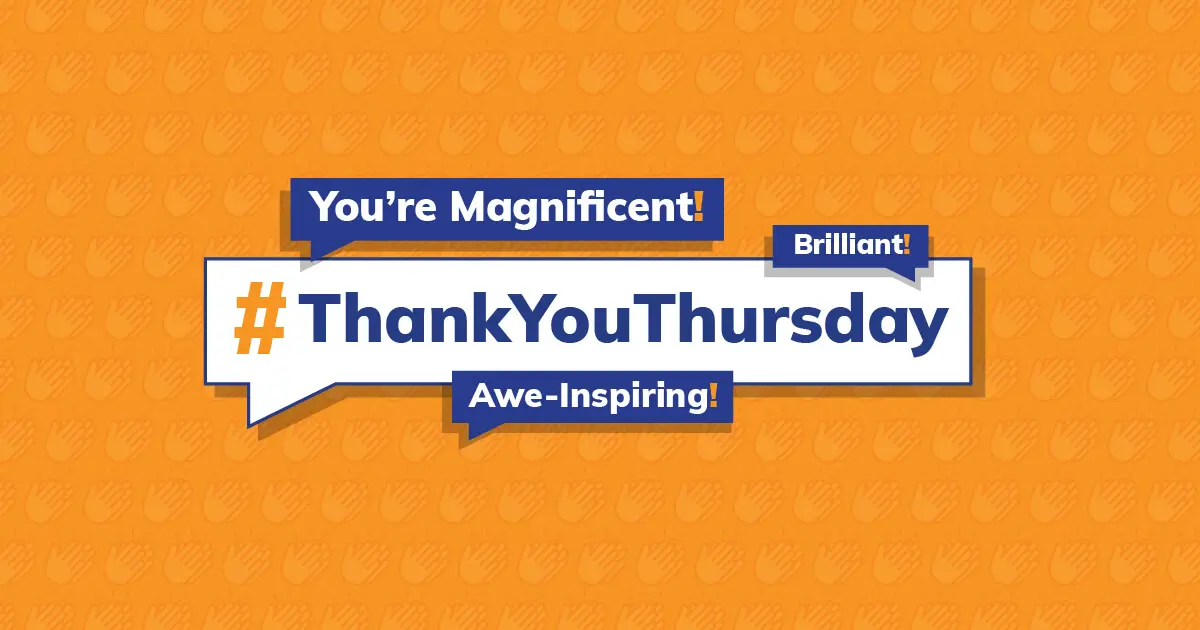The Power of Gratitude - #ThankYouThursday

When was the last time you felt fabulous?
It’s not a question we often ask ourselves. We possibly won’t like the answer, especially in a post Covid-19 world about to navigate the economic impact the pandemic is leaving us in. Is it possible to feel sanguine at a time where ‘hope’ as a concept feels a little fairy tale?
For longer than I can remember the media has placed priority upon negative stories with only the occasional heart felt mention of something feel good happening.
I’m sure there has been much research into the human propensity to focus on the bad and yet we find ourselves at a time where having a little bit more light would be well and truly welcomed.
While there have been suggestions of a roaring 20s-style revival, even this idea has been dampened by a healthy bout of pragmatism.
How to be grateful
I think it is clear that a free pass to a happier, more fulfilled existence is not necessarily waiting in the wings to be served on a platter, just because the world has had it tough.
There are things however, that can be done to adjust the filter we place upon our ever-unfolding experiences.
Research has shown that people who practice being grateful are happier, less stressed, enjoy better success at work and have higher self-esteem.
Can it be this simple though?
Our ability to feel appreciation needs to extend beyond identifying and being thankful for what we’ve got, rather than what we haven’t.
The level of self-reflection required to practice gratitude to the extent of it being impactful, is a skill we often only stumble across in life.
Unless privileged to experience the guidance of a doting grandparent or other significant person it is left to chance.
The advent of “social” media has contributed to the reduction of self reflective activities.
We are openly encouraged to thought vomit statuses onto a keyboard dispensing of them faster than we can finish the sentence and so it is little wonder why we might lose the ability to feel grateful, to reflect, ponder, appreciate.
Reflective skills
As we chase the endorphin inducing ‘like’ or ‘follow’, it is easy to be romanced by a superficial world that fabricates connection.
There are some great examples of ways to improve reflective skills, from Gibbs “Reflective Cycle” through to “Naikan”, the Japanese art of self-reflection and many in-between but developing self-reflection is just a part of it.
We must also consider the impact and influence we have when showing reflection, or rather appreciation to those around us.
I’m not talking about superficial off the shelf incentive schemes, I’m suggesting genuine forms of appreciation, gratitude and recognition that communicates to others that they are significant, important and valued.
Don’t underestimate the power of an integrity rich ‘thank you’.
The art of ensuring people receive a sense of validation, in part through the way we demonstrate our recognition of their efforts is just as significant as developing our own reflective skills. In fact, they go hand in hand.
Interestingly, when looking at teacher/student relationships, Alfie Kohn’s research on rewards shows that “while manipulating people with incentives seems to work in the short run, it is a strategy that ultimately fails and even does lasting harm.
Our workplaces and classrooms will continue to decline,” he argues, “until we begin to question our reliance on a theory of motivation derived from laboratory animals.”
False incentives
Drawing from hundreds of studies, Kohn demonstrates that people actually do inferior work when they are enticed with money, grades, or other incentives.
Programmes that use rewards to change people’s behaviour are similarly ineffective over the long run.
Promising goodies to children for good behaviour can never produce anything more than temporary obedience.
In fact, the more we use artificial inducements to motivate people, the more they lose interest in what we’re bribing them to do.
One of CPIs own core principles for behaviour and culture change within our training programmes is First Attention to Best Conduct.
Where we encourage professionals to consider focusing upon what is going right as opposed to a constant pressure to not get things wrong.
To get good at this takes practice, just like becoming attuned to self-reflection. A great start however is to simply thank someone for doing something that has made things better for you.
#ThankYouThursday
So we’d like to introduce you to our new campaign #ThankYouThursday. We want to encourage you to take some time each week to be thankful and show thanks to those around you whether they be colleagues, learners, patients, service users or friends and family.
If you are attending our conferences this year, you’ll have a #ThankYouThursday postcard in your delegate pack and you may start to see the postcards and pads around in your training or at our other events. We'll be practising what we preach at CPI and using them internally too.
You simply write your note, send it to your amazing person and, if you’d like your thank you to be even bigger, you (or the recipient) can share it with us on social media using the hashtag #ThankYouThursday.
Thank you for reading.
Schedule a Consultation
References
Kohn, A. (1993) Punished by rewards. The Trouble with Gold Stars, Incentive Plans, A’s, Praise and other Bribes. Houghton Mifflin
Gibbs, G. (1988). Learning by doing: A guide to teaching and learning methods. London: Further Education Unit.